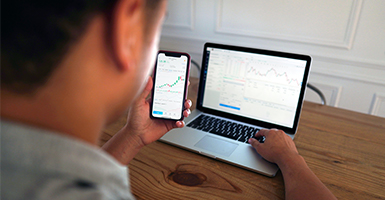Vivek Paul, Senior Portfolio Strategist together with Wei Li, Global Chief Investment Strategist, Elga Bartsch, Head of Macro Research and Natalie Gill, Portfolio Strategist, all forming part of the BlackRock Investment Institute, share their insights on global economy, markets and geopolitics. Their views are theirs alone and are not intended to be construed as investment advice.
Investors are grappling with an unusually wide range of potential economic outcomes beyond the post-pandemic restart, reflected in frequent shifts in equity market leadership and volatile bond yields. We stick to the anchor of our three key investment themes – and a broad strategic preference for equities over bonds in our updated long-term return assumptions. A more granular approach could help better capture these themes and provide diversification in portfolios, in our view.

Forward-looking estimates may not come to pass. Sources: BlackRock Investment Institute, with data from Refinitiv Datastream, July 2021. Notes: The chart shows 12-month forward earnings for the selected sectors within the MSCI USA and MSCI EMU indexes relative to their pre-Covid trend. Respective MSCI sector indexes are used as proxies. Indexes are unmanaged and do not account for fees. It is not possible to invest directly in an index.
Our three investment themes are the new nominal, or a more muted central bank policy response to higher inflation than in the past, China stands out as a distinct asset class and global growth engine, and the journey to net zero. We advance our portfolio construction tool kit in two ways to reflect a more granular approach: One, we take explicit views across the yield curve; two, in equities we use sectors as the unit of analysis to inform our regional views. Rising earnings growth expectations and low interest rates have helped offset the impact of higher equity prices on our overall expected long-term returns. We’ve witnessed diverging earnings expectations across regions and sectors during the pandemic. Some sectors in the U.S., such as IT, materials and communications, have dramatically eclipsed their pre-pandemic earnings estimates. See the chart. In Europe, earnings estimates still lag pre-Covid levels in some areas but the earnings revision ratio – the ratio of the number of stocks with corporate earnings upgrades to those with downgrades – has been rising sharply, supporting our recent tactical upgrade of European equities to overweight.
We believe a sectoral approach to asset allocation in equities will allow investors to better tap into structural themes that are being turbocharged by the pandemic, such as sustainability. Climate change and the green transition will likely affect all assets, but it will be most pronounced at the sector rather than broad market level, in our view. Some sectors may benefit from being aligned with the green transition, as solution providers or by being less exposed to transition risks, including tech and healthcare. Others such as energy and utilities may face longer-term challenges even if restart dynamics brighten their near-term appeal. Just to be clear: These are broad sectoral views – and some individual companies within sectors may buck these trends, creating opportunities for differentiation.
We maintain high conviction in our new nominal theme that implies low real yields – a positive for risk assets. The fall in long-dated yields through the second quarter – a reversal from the climb earlier in the year – has further eroded our expected long-run returns across government bonds and credit. Yet we believe the interest rate environment lends itself to more granularity because the new nominal is effectively all about varying views across different parts of the yield curve. We expect short-term yields to likely stay low as central banks keep policy accommodative, yet see longer-term yields gradually rising on the back of higher medium-term inflation and a revival of term premia (the compensation investors demand for holding riskier longer-term bonds). As a result we expect the yield curve to be steeper in five years than the market is currently pricing. The implication? A preference for shorter-dated nominal government bonds over longer maturities within our overall strategic underweight on the asset class.
The bottom line: We prefer equities to credit and government bonds in strategic portfolios, and see the need for a more granular approach. In fixed income, we prefer inflation-linked bonds to nominal government bonds due to our medium-term inflation expectations and the diminished diversification role of nominal bonds. The lower for longer rate environment also boosts the appeal of private markets for eligible investors, in our view. We also still see a strong strategic case for Chinese assets – especially government bonds – even after allowing for sizable uncertainties, in large part because we believe even a “neutral” strategic allocation to China is significantly higher than current index weights and modest client allocations to Chinese assets. We recognize that precise implementation of more granular views in practice can differ widely among different types of investors.

Past performance is not a reliable indicator of current or future results. Indexes are unmanaged and do not account for fees. It is not possible to invest directly in an index. Sources: BlackRock Investment Institute, with data from Refinitiv Datastream as of Sept. 9, 2021. Notes: The two ends of the bars show the lowest and highest returns at any point this year to date, and the dots represent current year-to-date returns. Emerging market (EM), high yield and global corporate investment grade (IG) returns are denominated in U.S. dollars, and the rest in local currencies. Indexes or prices used are, in descending order: spot Brent crude, MSCI USA Index, MSCI Europe Index, Bank of America Merrill Lynch Global High Yield Index, ICE U.S. Dollar Index (DXY), MSCI Emerging Markets Index, J.P. Morgan EMBI Index, Refinitiv Datastream Italy 10-year benchmark government bond index, Bank of America Merrill Lynch Global Broad Corporate Index, Refinitiv Datastream U.S. 10-year benchmark government bond index, Refinitiv Datastream Germany 10-year benchmark government bond index and spot gold.
Market backdrop
The ECB decided to reduce the pace of asset purchases under its pandemic emergency purchase program (PEPP) for the fourth quarter as expected. The central bank upgraded its growth and inflation forecast for this year, but expected inflation to remain far below target over the medium term. We expects the ECB to step up its regular asset purchases when the PEPP program expires early next year to achieve its medium-term price stability goals under its new policy framework. U.S. stocks declined from record high levels and the U.S. dollar rose as uncertainties over growth prospects weighed on markets.
Week Ahead
- Sept 14 – U.S. consumer price index (CPI)
- Sept 15 – China industrial output and retail sales; U.S. industrial production
- Sept 16 – U.S. Philly Fed Business Index
- Sept 17 – U.S. University of Michigan Surveys of consumers
All eyes are on August U.S. CPI data – and whether the monthly pace of price increases slowed down from July. The data will help investors assess the persistence and breadth of inflationary pressure amid the unprecedented restart dynamics. We believe the path of inflation will likely be higher than market pricing implies, mostly as a result of the policy revolution in response to the Covid shock and the shift in the Fed’s monetary policy framework.
BlackRock’s Key risks & Disclaimers:
This material is not intended to be relied upon as a forecast, research or investment advice, and is not a recommendation, offer or solicitation to buy or sell any securities or to adopt any investment strategy. The opinions expressed are as of September 13th, 2021 and may change. The information and opinions are derived from proprietary and non-proprietary sources deemed by BlackRock to be reliable, are not necessarily all-inclusive and are not guaranteed as to accuracy. As such, no warranty of accuracy or reliability is given and no responsibility arising in any other way for errors and omissions (including responsibility to any person by reason of negligence) is accepted by BlackRock, its officers, employees or agents. This material may contain ’forward looking’ information that is not purely historical in nature. Such information may include, among other things, projections and forecasts. There is no guarantee that any forecasts made will come to pass. Reliance upon information in this material is at the sole discretion of the reader.
The information provided here is neither tax nor legal advice. Investors should speak to their tax professional for specific information regarding their tax situation. Investment involves risk including possible loss of principal. International investing involves risks, including risks related to foreign currency, limited liquidity, less government regulation, and the possibility of substantial volatility due to adverse political, economic or other developments. These risks are often heightened for investments in emerging/developing markets or smaller capital markets.
Issued by BlackRock Investment Management (UK) Limited, authorized and regulated by the Financial Conduct Authority. Registered office: 12 Throgmorton Avenue, London, EC2N 2DL.
MeDirect Disclaimers:
This information has been accurately reproduced, as received from BlackRock Investment Management (UK) Limited. No information has been omitted which would render the reproduced information inaccurate or misleading. This information is being distributed by MeDirect Bank (Malta) plc to its customers. The information contained in this document is for general information purposes only and is not intended to provide legal or other professional advice nor does it commit MeDirect Bank (Malta) plc to any obligation whatsoever. The information available in this document is not intended to be a suggestion, recommendation or solicitation to buy, hold or sell, any securities and is not guaranteed as to accuracy or completeness.
The financial instruments discussed in the document may not be suitable for all investors and investors must make their own informed decisions and seek their own advice regarding the appropriateness of investing in financial instruments or implementing strategies discussed herein.
If you invest in this product you may lose some or all of the money you invest. The value of your investment may go down as well as up. A commission or sales fee may be charged at the time of the initial purchase for an investment. Any income you get from this investment may go down as well as up. This product may be affected by changes in currency exchange rate movements thereby affecting your investment return therefrom. The performance figures quoted refer to the past and past performance is not a guarantee of future performance or a reliable guide to future performance. Any decision to invest in a mutual fund should always be based upon the details contained in the Prospectus and Key Investor Information Document (KIID), which may be obtained from MeDirect Bank (Malta) plc.

